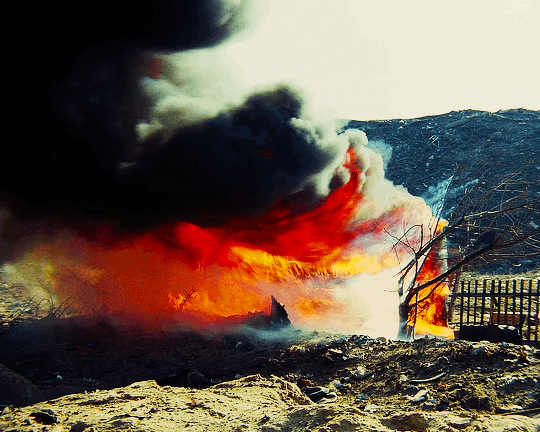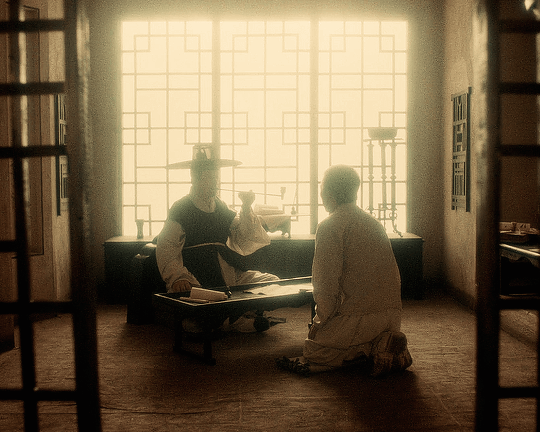#Koryo Saram
Explore tagged Tumblr posts
Text







"My son, you came into this world for one reason: revenge."
REVENGE (1988) dir. Yermek Shinarbayev
#revenge#worldcinemaedit#filmgifs#filmauteur#userkino#Yermek Shinarbayev#soviet cinema#kazakh cinema#revenge 1990#revenge 1989#Месть#central asian cinema#ermek shinarbaev#Ermek Bektasuly Shynarbaev#anatoli kim#kazakh new wave#koryo saram#myfilmgallery#ellisgifs#queue
68 notes
·
View notes
Text
This is a really interesting episode of the Dark Side of Seoul podcast, with an interview with a woman whose ancestors moved from Korea to Uzbekistan. The group of Koreans who migrated are known as Koryo Saram.
3 notes
·
View notes
Text

Portrait of a Koryo-saram mother and child.
The Koryo-saram are ethnic Koreans who initially settled in the Russian far-east starting from the 19th century, but were later scattered around the Soviet Union, including Central Asia, Siberia, Southern Russia and the Caucasus, and Southern Ukraine.
#soviet union#ussr#korean#koryo-saram#soviet#russia#caucaus#kavkaz#central asia#ukraine#고려사람#고려인#Корё сарам#koryoin
153 notes
·
View notes
Photo

Jung Dong-won, "The King of Baking Table Tennis" ('earth exploration life')
Source: k-star-holic.blogspot.com
0 notes
Text
i do see myself as korean in part but also... as koryo saram specifically. i dont really feel any connection with Korea. i sadly dont really feel like my family retained a lot of our culture. its hard to evaluate my identity in any way bc of discrimination and being forced to assimilate. i often think about if i only have a slavic name because i have to assimilate. or if it would even be okay for me to change my name or whatever. starts to bash my head against the wall until theres nothing left

31 notes
·
View notes
Text
i think i need to start making something very clear, as i should have done a long time ago.
Ukraine hasn't stopped needing your help and listening to our voices hasn't stopped being important
i think i've been way too patient and understanding with non-ukrainians following me. but i'm tired and angry and hurting and i've been carrying this burden, as all ukrainians have, for a very long time.
i am officially completely done with all those posts fucking "comparing" ukraine and palestine. i've tried to be understanding. i know you're trying to say that ukrainians get slightly better press coverage in the west due to white privilege, but our press coverage in the west is still dogshit. our genocide and colonization is still reduced to a "war" ukraine is still described as a "post-soviet state" and ethnic minorities in ukraine are still never mentioned. crimean tatars, koryo-saram, romani-ukrainians, jewish ukrainians, muslim-ukrainians, and many other communities have been disproportionately targeted by ruzzia's relentless violence and you still say nothing of their unique struggles and experiences. not to even mention how, although ukrainian diaspora in north america, like myself, have white privilege, ukrainians in europe face discrimination from both ruzzia and western europeans. they are not privileged
we are called slurs and subjected to other ethnically and culturally motivated violence by ruzzians very frequently when we try to tell our stories. ukrainian diaspora try to use our privilege and knowledge of english to advocate, but we are always shut down by ruzzians because we are always somehow either "too western" or "too ukrainian" to know what we are talking about.
and it really doesn't help that SOMEHOW none of you seem capable of caring about more than one genocide at a time. those posts comparing ukraine to palestine is all you have to say about us as our printing houses are being destroyed and our babies are being taken away and raised as ruzzians. weird! i don't seem to have this problem! caring about multiple genocides at a time and advocating for the liberty and power of all oppressed people is second nature to me. maybe because i don't have the privilege of only caring about one genocide at a time.
like sorry but i'm officially done. comparing which genocide is """""worse""""" is such a horrible and incomprehensibly evil thing to do. victims of genocide are standing together in solidarity. westerners with no connection to these issues do not have a seat at this table
#i don't expect this to achieve anything but it made me feel a little better so. there's that i guess#ukraine#colonial violence#colonialism#слава україні
51 notes
·
View notes
Text


So i Squid Game Au beam my two ocs
WON AE-RI:
- 36 years old
-A Koryo-saram from Volgaria
- Due to the war and oppression in Volgaristan, she and her family fled the country with the rest of her family and took refuge in Korea.
- When her family fell into debt after her mother fell ill shortly after her younger sister, she accepted the offer to participate in the Games without thinking in order to be able to be pay for their treatment.
- Ae-Ri is a irritabile,hot-headed, scary, and ferocious woman. But she is also a big-hearted, caring, maternal, protective, and loving woman.
MOON GI-CHEOL:
- 29 years old
- Also A Koryo-saram from Volgaria
- Gi-Cheol, alongside with his older brother, emigrated from Volgaria and seek refuge in Korea due to war and oppression of the regime in the country. He is the youngest child of a large family, but unfortunately, except for his eldest brother, all of his siblings (and his mother as well) lost their lives in the war in Volgaristan.
- Gi-Cheol participates in the games to earn money in order to extend /renew his and his brother's visas and to avoid being deported from the country.
- Gi-Cheol is basically a Korean Tanjiro Kamado from Demon Slayer (in personality wise) 😂. He also has similarities to Min-Su:His situation has made him seriously anxious and fearful. But he at the same time struggles to not let his anxiety and fear define and control him.
A/n: Volgaria is a fictional Eastern European country (neighboring Ukraine) where the story I'm working on takes place, and it's a country that's experiencing similar situations to Syria, Palestine, and Ukraine, and I wanted to include it in this au.
4 notes
·
View notes
Text
13 notes
·
View notes
Text
abt me!
hiii you can call me Pan, Vincian or Oscar
im plural traumagenic nondisordered
he/him and neutral gender terms ONLY(masc for memes is ok)
disabled and neurodivergent
asian, koryo-saram+turkic+east slavic
рус/eng
my toyhouse is Pyanse
I ALSO HAVE WEBTOONS https://www.webtoons.com/p/community/en/u/amogus
strawpage :000
DNi exclusionists, syscourse and anti-selfdiagnose

idk what to say more i just ned pinned
3 notes
·
View notes
Note
weird question but are you koryo saram? i swear i'm not trying to be weird but part of why i'm into hetalia is because i'm interested in ethnicities and like how they've come about and whatnot so i was just curious. you don't really have to answer this and i'm sorry if this makes you feel uncomfortable
(doofenshmirtz voice) if I had a nickel for everytime someone asked me this I'd have 2 nickels which isn't a lot but it's weird that it happened twice
im not actually(crowd boos), my parents moved to korea years ago so my siblings and I were born here + naturalized lol. i understand why i get this question though
my mom is part of the uzbek kazakh community in kazakhstan(where apparently they moved there all the way in the karakhan period 1000 years ago), so on paper our family looks like a korean kazakh family but we're ethnically all uzbek
there are a lot of koryo saram here too though! I don't know about now, but for a while they were allowed to get citizenship because of their ethnicity, and integration would depend on things like where they'd work to, what extent they'd be included in the space they were in(😔), also how good they can speak korean...
some koryo saram here have opened russian schools where the medium of instruction is russian, and ik some kids from the post soviet sphere go there, especially russian kids whose parents want them to keep their language.
there's also a post soviet neighborhood in incheon, there's uzbek bread places and restaurants wherever you go, and some signs(ex academies kindergartens) are in russian for the post soviet kids to understand.
4 notes
·
View notes
Text
i remember the time when someone wanted to organise a tour through korean kolkhozes for south koreans but the problem is that
1) most koreans don't live in rural areas anymore;
2) the most notable places with korean history are qızılorda (which is on the other side of the country away from almatı) and üctöbe (3-4 hours away from almatı by car);
3) üctöbe's history is mostly preserved through the local korean graveyard and a single very old korean lady who was a child when her family was deported;
4) bringing south koreans tourists to gawk at a small town with nothing to do but look at graves and harass an elderly woman about traumatic memories is. uh. a morally dubious idea;
5) koryo-saram don't speak koryo-mar anymore—the older generations, i.e. deportees and their children might still remember, but it was never a written language, so at best you'd only speak it or at least write approximations of pronunciation in cyrillic; and the younger generation doesn't know korean at all, and if they learn it they learn the standard of south korea.
so yeah... no kolkhoz tours
1 note
·
View note
Text
Still baffled that some people will try to justify ethnic cleansing or deportation in some circumstances. Like, no, even if their government is shitty or they share an ethnicity/language with a war enemy, that never justifies deporting hundreds of thousands of families away from their homes.
This isn't aimed at one specific group, there are quite a few that should hear this. And concerningly this also holds true in some leftist circles.
"Stalin did nothing wrong" tankies who actively try to justify the deportations of the Mekshetian Turks, of the Crimean Tatars, of the Koryo-saram, of the Volga Germans. Because "sharing an ethnicity with people colonized by an enemy" justifies labelling thousands of people as potential spies and deporting them to Kazakhstan according to them.
Fringe "Palestinian liberation" folks who pollute a perfectly legitimate (and needed) movement by forgetting the whole point of self-determination and instead calling for Israeli Jews to be deported back to Europe. (Yes I'm always ashamed to see the fraction of Palestinian liberation discourse that gets polluted by antisemitic shit)
On the other side, fringe "landback" folks who cheer on Palestinians being deported and expelled from Area C (even though that was never close to what landback was ever supposed to mean).
Yes, I've seen all of these in (different) leftist (or at least self-proclaimed leftist) circles and I'm ashamed. At some point you just have to realize that you're talking about other human beings, and that these are just ways of perpetuating state oppression and dividing people even more, which is the opposite of what leftist thought should stand for. We can do better, much better.
9 notes
·
View notes
Photo

Jung Dong-won, 'Uzbekistan's earth exploration life'
Source: k-star-holic.blogspot.com
0 notes
Text
my friend put koryo-saram subspace in my head and now that's just canon information about him to me. that is a slavic baby no matter what
0 notes
Text
one thing i intuited because im smart is that sergey is koryo-saram but she didn't tell me directly
0 notes